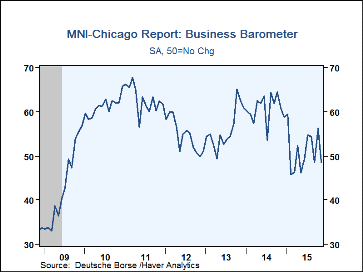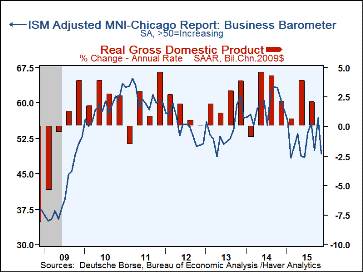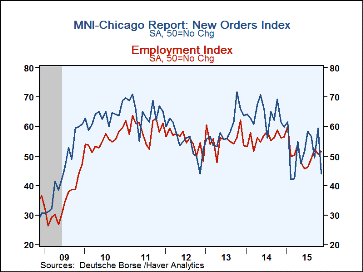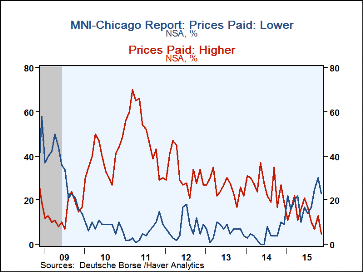 Global| Nov 30 2015
Global| Nov 30 2015Chicago Business Barometer Reverses Earlier Improvement; Suggests Economic Contraction
by:Tom Moeller
|in:Economy in Brief
Summary
The Chicago Business Barometer in November plummeted 7.5 points to 48.7 and fully reversed its October rise. The latest equaled the lowest reading since May 2015 and was led by a sharp decline in new orders. The drop in the overall [...]
The Chicago Business Barometer in November plummeted 7.5 points to 48.7 and fully reversed its October rise. The latest equaled the lowest reading since May 2015 and was led by a sharp decline in new orders. The drop in the overall index to below 50 indicates a contraction in economic activity in the Chicago area this month. It was the sixth time this year that the index pointed to a contraction. Expectations in the Action Economics Forecast Survey called for a lesser decline to 54.1.
Haver Analytics calculates an alternative index that employs the methodology used by the Institute for Supply Management to construct its index of activity (to be released tomorrow). This figure declined 7.6 points to 49.3, the lowest reading since October 2009. During the last ten years there has been a 61% correlation between the Business Barometer and the q/q change in real GDP.
The 15.3 point decline in the new orders component to 44.1 left it at the lowest level since March. This weakening was followed by a 12.5 point drop in production to 50.9, but that still suggested a slight increase in activity. These declines were apparently linked to the shedding of inventories. The 12.2 point drop in the inventory index left it at the lowest level since June. Slight improvement was registered by other component series, notably employment which gained to 51.6, the third consecutive month above the break-even level of 50. During the last ten years, there has been an 81% correlation between the index and the m/m change in factory sector payrolls.
The prices paid component eased to 42.2 and remained near the lows of the economic expansion. Only 5 percent of respondents reported higher prices, near the record low. Twenty-three percent of respondents indicated lower prices.
The MNI Chicago Report is produced by MNI/Deutsche Borse Group in partnership with ISM-Chicago. The survey covers a sample of over 200 purchasing managers in the Chicago area with a monthly response rate of about 50%. The ISM-Adjusted headline index is calculated by Haver Analytics using these data to construct a figure with the ISM methodology. The figures can be found in Haver's SURVEYS database. The Consensus expectations figure is available in AS1REPNA.
Low Inflation in the United States: A Summary of Recent Research from the Board of Governors of the Federal Reserve System is available here.
| Chicago Purchasing Managers Index (%, SA) | Nov | Oct | Sep | Nov '14 | 2014 | 2013 | 2012 |
|---|---|---|---|---|---|---|---|
| ISM-Adjusted General Business Barometer | 49.3 | 56.9 | 50.1 | 60.7 | 59.4 | 54.3 | 54.8 |
| General Business Barometer | 48.7 | 56.2 | 48.7 | 60.7 | 60.7 | 56.1 | 54.6 |
| Production | 50.9 | 63.4 | 43.6 | 66.2 | 64.5 | 58.3 | 57.6 |
| New Orders | 44.1 | 59.4 | 49.5 | 61.6 | 63.8 | 59.2 | 55.1 |
| Order Backlogs | 46.6 | 45.5 | 46.5 | 52.3 | 54.2 | 48.9 | 48.0 |
| Inventories | 48.3 | 60.5 | 52.9 | 61.4 | 56.0 | 45.7 | 51.4 |
| Employment | 51.6 | 50.6 | 52.3 | 56.3 | 56.0 | 55.6 | 55.3 |
| Supplier Deliveries | 51.7 | 50.8 | 52.4 | 58.0 | 56.5 | 52.5 | 54.8 |
| Prices Paid | 42.2 | 44.3 | 41.5 | 59.6 | 61.0 | 59.9 | 62.2 |
Tom Moeller
AuthorMore in Author Profile »Prior to joining Haver Analytics in 2000, Mr. Moeller worked as the Economist at Chancellor Capital Management from 1985 to 1999. There, he developed comprehensive economic forecasts and interpreted economic data for equity and fixed income portfolio managers. Also at Chancellor, Mr. Moeller worked as an equity analyst and was responsible for researching and rating companies in the economically sensitive automobile and housing industries for investment in Chancellor’s equity portfolio. Prior to joining Chancellor, Mr. Moeller was an Economist at Citibank from 1979 to 1984. He also analyzed pricing behavior in the metals industry for the Council on Wage and Price Stability in Washington, D.C. In 1999, Mr. Moeller received the award for most accurate forecast from the Forecasters' Club of New York. From 1990 to 1992 he was President of the New York Association for Business Economists. Mr. Moeller earned an M.B.A. in Finance from Fordham University, where he graduated in 1987. He holds a Bachelor of Arts in Economics from George Washington University.
More Economy in Brief
 Global| Feb 05 2026
Global| Feb 05 2026Charts of the Week: Balanced Policy, Resilient Data and AI Narratives
by:Andrew Cates










